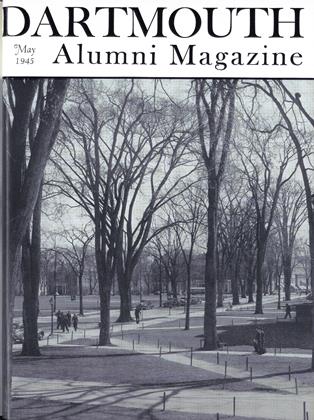ONE OF THE MOST POWERFUL FACTORS in the growth of Dartmouth to the well equipped modern institution of today was the understanding support given the College at crucial periods in its expansion by the Tuck family of Exeter, N. H., and Paris, France. From 1858, when Amos Tuck 1835, one of New Hampshire's leading citizens and a friend of Abraham Lincoln, became a Trustee until the death in 1938 of his son Edward Tuck '62, Dartmouth's greatest benefactor, the name of Tuck has loomed large in the development of the College and continues to be honored and cherished in its history.
Edward Tuck's first gift to Dartmouth of $1.00, presented in 1862, was "for unrestricted use" by the College. His later benefactions, which eventually reached the total of about 14,500,000, were made in the same generous spirit. A friend and college roommate of President Tucker and later a friend of President Hopkins, Mr. Tuck's devoted loyalty to Dartmouth and unswerving confidence in its administration as well as his munificent and timely gifts were of inestimable value to the College.
A part of the initial sum of $300,000 with which Mr. Tuck started the Edward Tuck Endowment Fund, which now amounts to about $3,500,000, was set aside at the suggestion of President Tucker to establish the first graduate school of business administration in this country which was named, at its founding in 1900, the Amos Tuck School of Business Administration in memory of Mr. Tuck's father. The Tuck School unit, Tuck Drive, the President's House, and the Edward Tuck Professorship of French Language and Literature were also made possible by gifts of Mr. Tuck.
Dartmouth's benefactor was born in Exeter, N. H., on August 24, 184 a, and grew up in that town in a family atmosphere of liberalism, uncompromising loyalty to ideals, and intellectual vigor. His father, called the "Voice of New Hampshire" and one of the state's most able lawyers, served three terms in the United States Congress and, as an ardent Abolitionist and friend of Lincoln, was one of the founders of the Republican Party. Edward Tuck entered Dartmouth, his father's college, from Phillips Exeter Academy. He graduated in 1862, as second ranking student in his class, Class Day Orator, and a Phi Beta Kappa. After a short period in the United States Consular Service in France, during which he rose to be viceconsul, Mr. Tuck joined the firm of John Munroe and Company, the only American bankers in Paris at that time. He left the firm, in which he eventually became a partner, in 1881 and, after a period in which he helped finance the development of railroads and mining enterprises in the West, returned to Paris where he made his home for the rest of his life.
He and his wife, the former Julia Stell, for whom the Tuck School dining hall is named, were deeply interested in philanthropic work and France and the French people benefitted greatly from the generosity of the Tucks. Both received notable honors from the nation, many of which had never before been conferred on foreigners.
Dartmouth's appreciation of Mr. Tuck's benefactions took both a tangible and an intangible form. In 1903, the College awarded him its highest academic honor, the degree of honorary Doctorate of Laws. But his name will be held in perpetuity by Dartmouth men and in Dartmouth's history in the highest esteem and gratitude.
AMOS TUCK, 1835
EDWARD TUCK, 1862
 View Full Issue
View Full Issue
More From This Issue
-
 Article
ArticleWHAT'S IN IT FOR US?
May 1945 By RICHARD E. LAUTERBACH '35 -
 Lettter from the Editor
Lettter from the Editor'Round the Girdled Earth
May 1945 -
 Article
ArticleLaureled Sons of Dartmouth
May 1945 By H. F. W. -
 Class Notes
Class Notes1918
May 1945 By ERNEST H. EARLEY, DONALD L. BARR -
 Class Notes
Class Notes1945
May 1945 By ARTHUR NICHOLS -
 Article
ArticleAMOS TUCK SCHOOL
May 1945 By HARRYR. WELLMAN '07
Article
-
 Article
ArticleMasthead
January 1920 -
 Article
ArticleTWO UNDERGRADUATES GUESTS OF ENGLISH-SPEAKING UNION
August, 1925 -
 Article
ArticleDR. JOHN T. DALLAS ELECTED AS BISHOF
January, 1926 -
 Article
ArticleMore Webster Letters
July 1974 -
 Article
ArticleGive a Rouse
FEBRUARY 1994 -
 Article
ArticleGym Talk: The Athletic Council
February 1934 By C. E. W.


